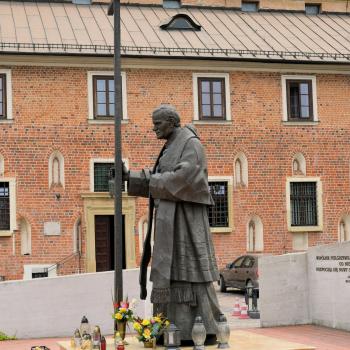The protégé effect is not a recent discovery. Saint Augustine taught it centuries ago. I am always amazed when I go to the greats of the past and discover something that we thought was new to our own century. Learning from the greats is one of the treats of existing later in the course of human history. If we were contemporaries of Marc Antony and Cleopatra, we could read about some interesting political factoids of the day, but we would be missing out on the wonderful Stoic wisdom of Marcus Aurelius.
As Christians, perhaps we can feel a bit nostalgic that we seem so removed from the life and times of Jesus. The languages of the Bible seem inaccessible to us. The cultural context is so far removed, that it becomes very difficult for us to access the knowledge contained there. At the same time, however, we can rejoice that we can learn so much from the men and women that have come before us.
Augustine is a Father of the Church. This means that we recognize him as someone who contributed greatly to the understanding of the Church and Christianity from the earliest centuries. There is a closeness to Scripture and Biblical culture that we can only wish to emulate.
In his wonderful treatise, De Doctrina Christiana, he explains to us how to read the Bible. As I read the first paragraph, I was fascinated by what he had to say. I think we can glean 3 keys from what he says that will help us read Scripture better. It will help us also, however, generally speaking in our reading comprehension.
What is to be understood and how do we share the information
I must confess; going back to the text has inspired me to look at the Latin at least. I find it extremely satisfactory to put in a bit of mental strain and read the words in the original. Even if for me, I flip back and forth between the original and a worthy translation. Maybe with time, I will be more comfortable looking purely at the original.
“Duae sunt res quibus nititur omnis tractatio Scripturarum, modus inveniendi quae intellegenda sunt et modus proferendi quae intellecta sunt.” (Augustine, De Doctrina Christiana, 1.1.) There are two things that are worthwhile when reading Scripture. We have to figure out what is to be understood and how to transmit to others that which has been understood. Somehow, it feels more elegant in the original.
Protégé effect
It is quite genius, what he is saying, though. Most of us would think of the first half. When we read, we want to understand what is being said. This is basic reading comprehension. But to take a step further, to look at how to communicate that newly gained information, this is the genius part. It is true that we learn better when we learn to teach. “The protégé effect is a psychological phenomenon where teaching, pretending to teach, or preparing to teach information to others helps a person learn that information.” (Effectiviology, “The Protégé Effect”) Perhaps many of us have had this experience while preparing for a test. Posing as the teacher transmitting the material can make it stick better in our own heads.

Possessing knowledge by giving it away
The central point and most fascinating is, however, our psychological need to share what we have comprehended. “Omnis enim res quae dando non deficit, dum habetur et non datur, nondum habetur quomodo habenda est. (Augustine, De Doctrina Christiana, 1.1.) Everything that does not diminish, by having it and not giving it, one does not possess it as it is meant to be possessed. So, if you have a lot of money and give some away, you have less money. But if you have knowledge and refuse to give it to others, you do not have it as you should. Knowledge and understanding are meant to be shared.
My attention was called to this point by an old lecture that the Trappist monk Thomas Merton gave to some young seminarians. I had heard the concept before, but somehow in this telling; it grabbed my attention. In fact, it inspired me to pick up the text of De Doctrina Christiana and I am very happy that I did.
It is a clarion call to my soul. How many things do we learn passively and barely hold onto? We learn so much better when we learn to teach and to share. The incredible thing is that we possess the material much better if we ourselves share it. It reminds me of my seminary days. When I took on a role as academic guide and seminar guide for philosophy, I began to master the topics that I had studied for years in a whole new way.
Multiplication like the loaves and fish
In a way, intellectual knowledge recreate the miracle of the multiplication of the loaves. When we share the spiritual riches that we receive from meditating on God’s Word, they grow up much more in our hearts. The more we give knowledge away, the more it takes root in our own minds and hearts.
The protégé effect can make a huge difference in the one imparting the information. This is my own motivating factor to be sharing knowledge. I want to know, reflect on, and assimilate the material. I hope that, like Augustine, by giving out the crumbs of my knowledge, I may come to hold on to the bread that is Christ the Lord.
Read another reflection on St. Augustine here.














